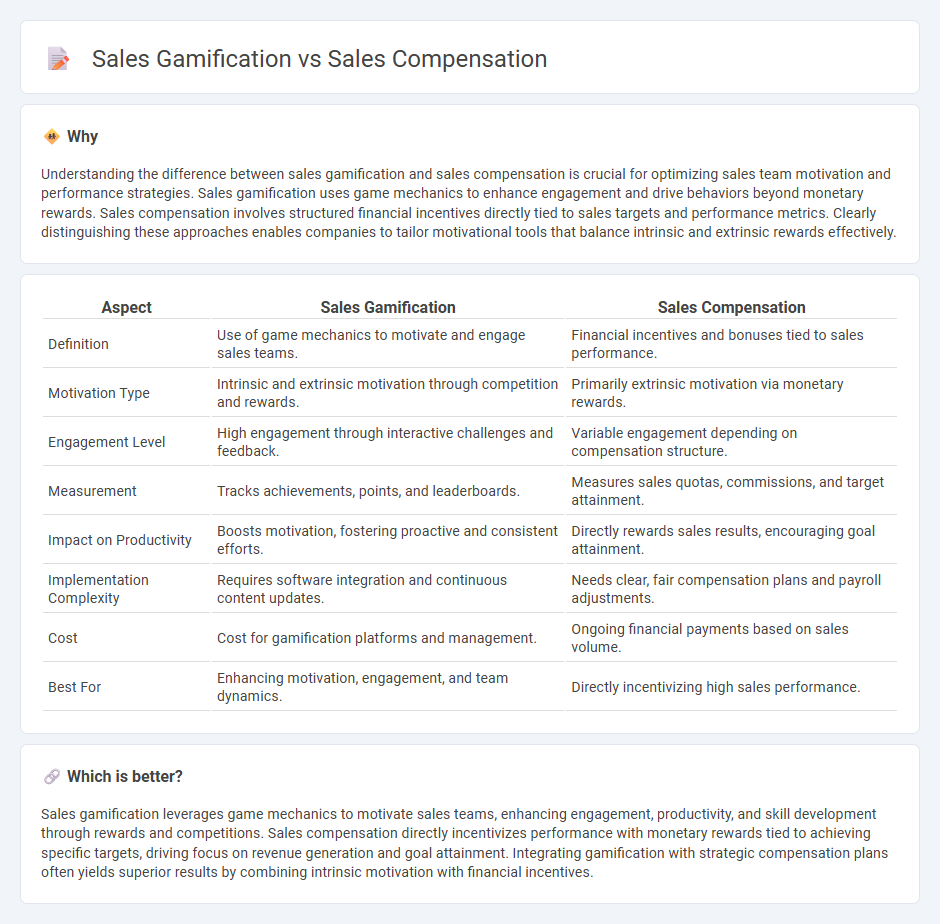
Sales gamification leverages game mechanics and motivational strategies to boost engagement, performance, and teamwork among sales teams, creating a dynamic and interactive environment. Sales compensation focuses on structured financial incentives such as commissions, bonuses, and awards to directly reward sales achievements and drive measurable results. Explore how combining gamification with compensation plans can maximize sales productivity and enhance motivation.
Why it is important
Understanding the difference between sales gamification and sales compensation is crucial for optimizing sales team motivation and performance strategies. Sales gamification uses game mechanics to enhance engagement and drive behaviors beyond monetary rewards. Sales compensation involves structured financial incentives directly tied to sales targets and performance metrics. Clearly distinguishing these approaches enables companies to tailor motivational tools that balance intrinsic and extrinsic rewards effectively.
Comparison Table
| Aspect | Sales Gamification | Sales Compensation |
|---|---|---|
| Definition | Use of game mechanics to motivate and engage sales teams. | Financial incentives and bonuses tied to sales performance. |
| Motivation Type | Intrinsic and extrinsic motivation through competition and rewards. | Primarily extrinsic motivation via monetary rewards. |
| Engagement Level | High engagement through interactive challenges and feedback. | Variable engagement depending on compensation structure. |
| Measurement | Tracks achievements, points, and leaderboards. | Measures sales quotas, commissions, and target attainment. |
| Impact on Productivity | Boosts motivation, fostering proactive and consistent efforts. | Directly rewards sales results, encouraging goal attainment. |
| Implementation Complexity | Requires software integration and continuous content updates. | Needs clear, fair compensation plans and payroll adjustments. |
| Cost | Cost for gamification platforms and management. | Ongoing financial payments based on sales volume. |
| Best For | Enhancing motivation, engagement, and team dynamics. | Directly incentivizing high sales performance. |
Which is better?
Sales gamification leverages game mechanics to motivate sales teams, enhancing engagement, productivity, and skill development through rewards and competitions. Sales compensation directly incentivizes performance with monetary rewards tied to achieving specific targets, driving focus on revenue generation and goal attainment. Integrating gamification with strategic compensation plans often yields superior results by combining intrinsic motivation with financial incentives.
Connection
Sales gamification leverages game mechanics to motivate sales teams by rewarding achievements with points, badges, or prizes, driving higher engagement and performance. Effective sales compensation plans align financial incentives with these gamified targets, ensuring that top performers receive bonuses or commissions that reinforce desired behaviors. Integrating gamification with strategic compensation structures results in enhanced motivation, improved sales productivity, and measurable revenue growth.
Key Terms
**Sales Compensation:**
Sales compensation involves structured financial incentives designed to motivate sales teams, including base salary, commissions, bonuses, and performance-based rewards that directly influence sales productivity and alignment with company goals. Effective sales compensation plans drive consistent revenue growth by rewarding measurable achievements and encouraging desired sales behaviors. Explore detailed strategies and best practices to optimize your sales compensation plan for maximum impact.
Commission
Sales compensation primarily revolves around commission-based structures that directly reward sales representatives for achieving specific revenue targets, driving motivation through financial incentives. Sales gamification integrates game mechanics, such as points and leaderboards, with commission plans to enhance engagement and foster a competitive sales environment. Discover how leveraging commission strategies within sales gamification can optimize performance by exploring effective implementation techniques.
Base Salary
Sales compensation structures often emphasize base salary as a fixed income component ensuring financial stability for sales representatives. In contrast, sales gamification leverages dynamic rewards and recognition without altering the base salary, motivating performance through engaging, game-like elements. Explore more on how balancing base salary with gamification strategies drives sales success.
Source and External Links
Sales Compensation Plans: Complete Guide & Examples - Salesforce - Sales compensation plans outline how sales reps earn their pay, typically combining a base salary with commissions that vary based on role complexity and sales performance.
What is Sales Compensation Planning? Comprehensive Guide - Sales compensation planning is a strategic process to attract, motivate, and retain top sales talent by defining pay structures--including salary, commission, incentives, and benefits--tailored to business goals and market conditions.
Sales Compensation: What a Plan Can Look Like & How to ... - The most common sales compensation structure is base salary plus commission, offering sales reps income security alongside performance-based earnings.
 dowidth.com
dowidth.com